|
|
|
Sort Order |
|
|
|
Items / Page
|
|
|
|
|
|
|
| Srl | Item |
| 1 |
ID:
132353
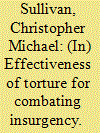

|
|
|
|
|
| Publication |
2014.
|
| Summary/Abstract |
It is commonly believed that torture is an effective tool for combating an insurgent threat. Yet while torture is practiced in nearly all counterinsurgency campaigns, the evidence documenting torture's effects remains severely limited. This study provides the first micro-level statistical analysis of torture's relation to subsequent killings committed by insurgent and counterinsurgent forces. The theoretical arguments contend that torture is ineffective for reducing killings perpetrated by insurgents both because it fails to reduce insurgent capacities for violence and because it can increase the incentives for insurgents to commit future killings. The theory also links torture to other forms of state violence. Specifically, engaging in torture is expected to be associated with increased killings perpetrated by counterinsurgents. Monthly municipal-level data on political violence are used to analyze torture committed by counterinsurgents during the Guatemalan civil war (1977-94). Using a matched-sample, difference-in-difference identification strategy and data compiled from 22 different press and NGO sources as well as thousands of interviews, the study estimates how torture is related to short-term changes in killings perpetrated by both insurgents and counterinsurgents. Killings by counterinsurgents are shown to increase significantly following torture. However, torture appears to have no robust correlation with subsequent killings by insurgents. Based on this evidence the study concludes that torture is ineffective for reducing insurgent perpetrated killings.
|
|
|
|
|
|
|
|
|
|
|
|
|
|
|
|
| 2 |
ID:
178914
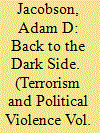

|
|
|
|
|
| Summary/Abstract |
Since the CIA’s inception, elements of the Agency have researched, used, and taught interrogation tactics for national security and counterterrorism purposes. These have sometimes constituted torture, cruel, inhuman, or degrading treatment, and ethical violations. Using the lens of Institutional Change Theory and investigating critical junctures in CIA history, this paper shows that a lack of meaningful internal and external oversight and accountability measures can explain the CIA’s recurrent use and propagation of torture and abuse in interrogation. These findings have implications for future counterterrorism interrogation policy, and preventing the use of ineffective, unethical techniques
|
|
|
|
|
|
|
|
|
|
|
|
|
|
|
|
| 3 |
ID:
127803
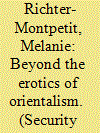

|
|
|
|
|
| Publication |
2014.
|
| Summary/Abstract |
Contrary to commonsense understandings of torture as a form of information-gathering, confessions elicited through the use of torture produce notoriously unreliable data, and most interrogation experts oppose it as a result. With a focus on the US carceral regime in the War on Terror, this article explores the social relations and structures of feelings that make torture and other seemingly ineffective and absurd carceral practices possible and desirable as technologies of security. While much of international relations scholarship has focused on the ways in which affective and material economies of Orientalism are central to representations of the 'terrorist' threat, this article connects the carceral violences in the racialized lawfare against Muslimified people and spaces to the capture and enslavement of Africans and the concomitant production of the figure of the Black body as the site of enslaveability and openness to gratuitous violence. The article further explores how these carceral security practices are not simply rooted in racial-sexual logics of Blackness, but themselves constitute key sites and technologies of gendered and sexualized race-making in this era of 'post-racial triumph' (HoSang and LaBennett, 2012: 5).
|
|
|
|
|
|
|
|
|
|
|
|
|
|
|
|
| 4 |
ID:
164463


|
|
|
|
|
| Summary/Abstract |
Following the attacks of 9/11, the United States adopted a policy of torturing suspected terrorists and reinterpreted its legal obligations so that it could argue that this policy was lawful. This article investigates the impact of these actions by the United States on the global norm against torture. After conceptualizing how the United States contested the norm against torture, the article explores how US actions impacted the norm across four dimensions of robustness: concordance with the norm, third-party reactions to norm violations, compliance, and implementation. This analysis reveals a heterogeneous impact of US contestation: while US policies did not impact global human rights trends, it did shape the behavior of states that aided and abetted US torture policies, especially those lacking strong domestic legal structures. The article sheds light on the circumstances under which powerful states can shape the robustness of global norms.
|
|
|
|
|
|
|
|
|
|
|
|
|
|
|
|
| 5 |
ID:
116256
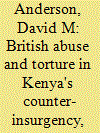

|
|
|
|
|
| Publication |
2012.
|
| Summary/Abstract |
Accusations of abuse and torture in the counter-insurgency campaign against Mau Mau rebels in Kenya were widely publicised during the 1950s. The typical British response was to issue official denials, and when prosecutions did arise the perpetrators were characterised as pathological, their behaviour presented as isolated and exceptional. New evidence found in the British colonial 'Migrated Archive' for Kenya now confirms that the practice of torture and abuse was widespread, amounting to a systematic pattern of state policy. This article rejects dispositional and individual explanations of British torture in Kenya and instead examines the violence in temporal and structural terms, showing how the toleration of violence at an early stage of the Emergency led to its institutionalisation in Kenya's detention camps at a later stage. The article offers evidence from the screening process in the first phase of the counter-insurgency campaign, and from the 'dilution technique' applied in the detention camps after 1956 in the final phase of the war to illustrate the argument. The concluding discussion explores the dilemmas confronting Kenya's colonial violence workers and their political masters as they struggled to present torture as lying within the 'rule of law'.
|
|
|
|
|
|
|
|
|
|
|
|
|
|
|
|
| 6 |
ID:
147852
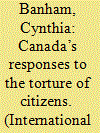

|
|
|
|
|
| Summary/Abstract |
Traditional analyses of Canada’s behaviour on international human rights tend to view it through the prism of the state’s global identity as a good international citizen. Such explanations are limited in helping us understand Canada’s inconsistent responses to allegations that two citizens were tortured in the war on terror—Maher Arar and Omar Khadr. This article uses Jutta Brunnée and Stephen Toope’s interactional account, which emphasizes the need for continuous shared practices of legality in order for international human rights norms to exert influence, to analyze Canada’s responses to the torture of citizens. It argues that to make sense of Canada’s behaviour, we need to examine the role of different state and non-state actors in terms of whether they were agitating for Canada’s compliance with the international prohibition against torture. Civil society was critical in shaping the responses of the Canadian state to the torture of citizens.
|
|
|
|
|
|
|
|
|
|
|
|
|
|
|
|
| 7 |
ID:
120009
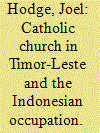

|
|
|
|
|
| Publication |
2013.
|
| Summary/Abstract |
During the Indonesian occupation of Timor-Leste (1975-99), the Roman Catholic Church grew in importance to the East Timorese people. This is demonstrated by the large increase in Timorese affiliation to the Church: 25-30% of the populace were baptized Catholics in 1975 compared with over 90% in the 1990s. Various explanations have been offered for this growth, many of which identify 'extrinsic' factors such as the religious prescriptions of Indonesian law or the pressures of Islamization. While acknowledging the importance of these factors, this paper argues that certain intrinsic factors substantially influenced the identification of the Timorese experience of occupation with Catholic faith and solidarity. An understanding of these intrinsic factors can provide a more expansive understanding of Timorese culture, experience and history. Drawing on original research into the faith and experience of Timorese people during the occupation, the author explores the relationship between suffering, resistance and the Catholic faith of the Timorese in four areas: language; 'a spirituality of resistance'; martyrdom; and sanctuary and advocacy for the persecuted. The paper draws on the insights of French philosopher and literary critic, René Girard, regarding the importance of Christianity in the context of violence. Girard has argued for a particular understanding of the centrality of the victim in human culture and of how Christianity helps to reveal this centrality. Girard's perspective sheds light on how the Timorese came to terms with their experience of suffering and violence under Indonesian occupation through their identification with Jesus Christ and the Church.
|
|
|
|
|
|
|
|
|
|
|
|
|
|
|
|
| 8 |
ID:
152871
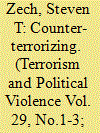

|
|
|
|
|
| Summary/Abstract |
In this article I identify and evaluate numerous reasons why torture became common practice during the state counterterrorism campaign in Peru between 1980 and 2000, despite international and domestic legal obligations to protect human rights. I describe common structural conditions, organizational factors, and individual-level explanations often associated with torture practices. I then identify seven logics and motivations behind torture use in counterterrorism campaigns. I describe and analyze actual torture use in Peru using quantitative incident-level data, and I provide descriptive statistics concerning variation in the frequency and methods of torture. Finally, I examine specific incidents of torture to illustrate and assess the different logics and motivations for torture. I draw heavily from testimonies collected by Peru's Truth and Reconciliation Commission. I also rely on personal interviews carried out during fieldwork in the Junín and Ayacucho regions of Peru. I find that aggregate torture incidents generally coincide with political developments and shifts in violence levels and that the various state security forces used torture differently. A review of testimonies regarding specific incidents of torture suggests that multiple logics motivate state security forces, even for a single incident of torture, complicating academic efforts to formulate a parsimonious causal explanation.
|
|
|
|
|
|
|
|
|
|
|
|
|
|
|
|
| 9 |
ID:
133541
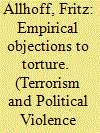

|
|
|
|
|
| Publication |
2014.
|
| Summary/Abstract |
Those who support torture in ticking-time-bomb cases are often criticized as failing to consider empirical objections to torture; however, torture's critics often wield this charge uncritically, doing little more than throwing out platitudes without considering the role of those platitudes in the dialectic. I agree with the critics that more empirical engagement is owed than is typically on offer, but deny that such engagement vindicates their position. This article therefore considers various stock objections to the actual use of torture, while ultimately arguing that those objections fail to undermine the use of torture in exceptional cases. In particular, we will consider the efficacy and reliability of torture, the institutional requirements for torture, the nefarious spread of torture, and whether there are better alternatives to torture. In each of these discussions, let us frame them against the associated contentions made by critics regarding the inapplicability of ticking-time-bomb cases to the real world. The last two sections of the article consider where the burden of proof falls in this debate and, in particular, whether the proponent of torture needs real-world ticking-time-bomb cases to defend exceptional torture, as well as what such cases might be.
|
|
|
|
|
|
|
|
|
|
|
|
|
|
|
|
| 10 |
ID:
185154
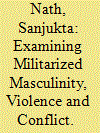

|
|
|
|
|
| Summary/Abstract |
The article analyses how masculine social norms shape the idea of survivors/victims in International Politics. It will conceptually analyse how masculine social norms have been normalised through militarism and militarized masculinity in international politics. In this process, it will locate how international politics has conceived male survivors of sexualised torture. It will use a gender lens in understanding the discourse and practice of torture in armed conflicts. It argues that there exists a gender-based binary in the way victimhood in conflict situations has been perceived in international politics where victims are generally seen to be women and the perpetrators are men. It uses a critical feminist perspective in problematizing the essentialist gender-based binary between victims and perpetrators of violence particularly sexual and gender-based violence. There exists silence in international politics in the ways that male victims of sexualised torture during conflict situations have been perceived in international politics. This silence reflects the power of social construction of masculinity in international politics. The silence is manifested in the way sexual and gender-based violence on men and boys in conflict situations have been often seen under the broad rubrics of torture which overlooks the sexual harm involved in the practice.
|
|
|
|
|
|
|
|
|
|
|
|
|
|
|
|
| 11 |
ID:
105992
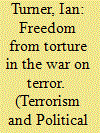

|
|
|
|
|
| Publication |
2011.
|
| Summary/Abstract |
Freedom from torture is regarded as "absolute," meaning that a state cannot infringe the right for purposes which would seem legitimate such as the protection of national security. Indeed, the freedom is viewed as "non-derogable"; that is, infringements are not permitted even in special circumstances such as times of war or public emergency. Is it right, however, with the growth in international terrorism post-9/11, particularly suicide violence, that the freedom should remain without limitation? Perhaps the torture of terror suspects might provide state authorities with intelligence so that acts of atrocity can be averted? To go on and construct a possible argument justifying ill-treatment against a detainee this article questions whether in fact freedom from torture can be categorised as absolute.
|
|
|
|
|
|
|
|
|
|
|
|
|
|
|
|
| 12 |
ID:
144781
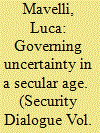

|
|
|
|
|
| Summary/Abstract |
This article explores the problem of governing uncertainty in a secular age by focusing on the theological notion of ‘theodicy’ as the underlying rationale for the use of torture in the so-called ‘war on terror’. With God’s departure from the world, the problem of uncertainty acquires new salience as human beings can no longer explain tragic events as part of a transcendent order and must find immanent causes for the ‘evils’ that surround them. Taking a cue from Max Weber, I discuss how the problem of theodicy – how to reconcile the existence of God with the presence of evil in the world – does not disappear in the secular age but is mobilized through a Foucauldian biopolitical logic. Secular theodicy governs uncertainty through the production of economies of knowledge that rationalize processes of criminalization and securitization of entire groups and justify the use of violence. This process is particularly striking when analysing the use of torture in the so-called ‘war on terror’. Through a comparison with medieval practices and focusing on the cases of Guantanamo and Abu Ghraib, the article shows how secular torture is the product of a biopolitical theodicy aimed at governing uncertainty through the construction of the tortured as immanent evils who threaten our ‘good life’ and ‘deserve’ their treatment. Secular theodicy turns torture into an extreme form of governmentality of uncertainty in which the disciplining of conduct becomes the construction of subjectivities based on essentialist, stereotypical and racist – and for these very reasons, reassuring – economies of knowledge.
|
|
|
|
|
|
|
|
|
|
|
|
|
|
|
|
| 13 |
ID:
095050
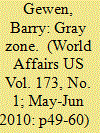

|
|
|
| 14 |
ID:
163102
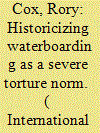

|
|
|
|
|
| Summary/Abstract |
The debate on waterboarding and the wider debate on torture remains fiercely contested. President Trump and large sections of the US public continue to support the use of waterboarding and other so-called ‘enhanced interrogation techniques’ as part of the ‘War on Terror’, thus putting the anti-torture norm under pressure. This article demonstrates that the re-imagining of waterboarding as ‘torture-lite’ is contradicted by the long history of waterboarding itself. Examining pre-modern uses and descriptions of torture and waterboarding, this article highlights that the post-2001 identification of waterboarding as a relatively benign interrogation technique radically inverts a norm that has predominated for over 600 years. This historical norm unequivocally identifies waterboarding not only as torture but as severe torture. The article highlights the value of historically contextualizing attitudes to torture, reviews how and why waterboarding was downgraded by the Bush Administration, reveals the earliest explicit description of waterboarding from 1384, and argues that the twenty-first-century re-imagining of waterboarding as torture-lite is indicative of the fragility of the anti-torture norm.
|
|
|
|
|
|
|
|
|
|
|
|
|
|
|
|
| 15 |
ID:
157723
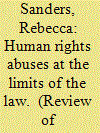

|
|
|
|
|
| Summary/Abstract |
Law following and law breaking are often conceptualised as polar opposites. However, authorities in liberal democracies increasingly deploy a strategy of what I call plausible legality in order to secure immunity and legitimacy for proscribed practices. Rather than ignore or suspend law, they construct legal justifications for human rights abuses and other dubious policies, obscuring the distinction between legal compliance and non-compliance. I argue this is possible because instabilities in legal rules make them vulnerable to manipulation and exploitation. By tracing American rationales for contentious ‘enhanced interrogation techniques’, indefinite detention, and ‘targeted killing’ practices in the ‘Global War on Terror’, I show that law need not always be abandoned or radically reconstituted to achieve troubling ends and that rule structures enable certain patterns of violation while limiting others. The international prohibition on torture is robust and universal, but provides vague definitions open to interpretation. Detention and lethal targeting regulations are jurisdictionally layered and contextually complex, creating loopholes and gaps. The article concludes by reflecting on implications for the protection of human rights. While law is not wholly indeterminate, human rights advocates must constantly advocate shared legal understandings that constrain state violence.
|
|
|
|
|
|
|
|
|
|
|
|
|
|
|
|
| 16 |
ID:
175276
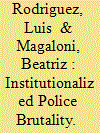

|
|
|
|
|
| Summary/Abstract |
How can societies restrain their coercive institutions and transition to a more humane criminal justice system? We argue that two main factors explain why torture can persist as a generalized practice even in democratic societies: weak procedural protections and the militarization of policing, which introduces strategies, equipment, and mentality that treats criminal suspects as though they were enemies in wartime. Using a large survey of the Mexican prison population and leveraging the date and place of arrest, this paper provides causal evidence about how these two explanatory variables shape police brutality. Our paper offers a grim picture of the survival of authoritarian policing practices in democracies. It also provides novel evidence of the extent to which the abolition of inquisitorial criminal justice institutions—a remnant of colonial legacies and a common trend in the region—has worked to restrain police brutality.
|
|
|
|
|
|
|
|
|
|
|
|
|
|
|
|
| 17 |
ID:
117994
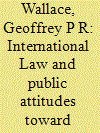

|
|
|
|
|
| Publication |
2013.
|
| Summary/Abstract |
Domestic approaches to compliance with international commitments often presume that international law has a distinct effect on the beliefs and preferences of national publics. Studies attempting to estimate the consequences of international law unfortunately face a wide range of empirical and methodological challenges. This article uses an experimental design embedded in two U.S. national surveys to offer direct systematic evidence of international law's effect on mass attitudes. To provide a relatively tough test for international law, the surveys examine public attitudes toward the use of torture, an issue in which national security concerns are often considered paramount. Contrary to the common contention of international law's inefficacy, I find that legal commitments have a discernible impact on public support for the use of torture. The effect of international law is also strongest in those contexts where pressures to resort to torture are at their highest. However, the effects of different dimensions in the level of international agreements' legalization are far from uniform. In contrast to the attention often devoted to binding rules, I find that the level of obligation seems to make little difference on public attitudes toward torture. Rather, the relative precision of the rules, along with the degree to which enforcement is delegated to third parties, plays a much greater role in shaping public preferences. Across both international law and legalization, an individual's political ideology also exerts a strong mediating effect, though in varying directions depending on the design of the agreement. The findings have implications for understanding the overall impact of international law on domestic actors, the importance of institutional design, and the role of political ideology on compliance with international agreements.
|
|
|
|
|
|
|
|
|
|
|
|
|
|
|
|
| 18 |
ID:
074176
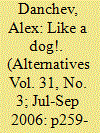

|
|
|
|
|
| Publication |
2006.
|
| Summary/Abstract |
An examination of the disturbing practice of torture and abuse in the "global war on terror," focusing on the methods and motivations of the United States. Proceeding from the imaginary yet all-too-real world of Kafka and the Kafkaesque, it highlights the themes of humiliation and shame in the waging of this war, noting that the damage so caused is reciprocal and indivisible: "Whoever degrades another degrades me."
|
|
|
|
|
|
|
|
|
|
|
|
|
|
|
|
| 19 |
ID:
074926
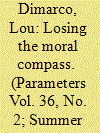

|
|
|
|
|
| Publication |
2006.
|
| Summary/Abstract |
One of the keys to success in the US war on terror and counterinsurgency, in Iraq and around the world, is the ability to use intelligence to effectively target the adversary. Obtaining useful intelligence is one of the most important challenges of counterinsurgency operations. This requirement has focused attention on the interrogation of combatants captured on the battlefield and in raids on safe-houses in third-party states.
Almost from the beginning of US counterinsurgency operations in Afghanistan and Iraq, accusations have been made that US interrogation techniques have included torture.
|
|
|
|
|
|
|
|
|
|
|
|
|
|
|
|
| 20 |
ID:
087457
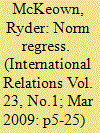

|
|
|
|
|
| Publication |
2009.
|
| Summary/Abstract |
Is the norm against torture suffering a crisis of legitimacy within the United States, and if so, does this constitute a crisis in the norm itself? Can constructivist international relations theory explain how the norm came to be significantly weakened by its most important proponent? Constructivist literature on norms has hitherto suffered from a `nice norm bias' that does not adequately take into account the reversibility of so-called `internalized' norms like the one prohibiting torture. Through an examination of the rhetoric, policies and practices surrounding US interrogation after 9/11, this article addresses omissions in constructivist literature by providing a theoretical model to explain `norm regress', or the death of norms. It claims that the torture norm is suffering a crisis of legitimacy within the United States and any future incidences of torture by liberal states may well bring about a crisis of legitimacy in the international norm itself.
|
|
|
|
|
|
|
|
|
|
|
|
|
|
|
|
|
|
|
|
|